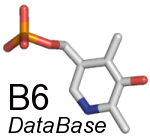|
|
| type |
Journal Article |
| authors |
Liu Y, Nakamura A, Nakazawa Y, Asano N, Ford KA, Hohn MJ, Tanaka I, Yao M, Söll D. |
| title |
Ancient translation factor is essential for tRNA-dependent cysteine biosynthesis in methanogenic archaea. |
| journal |
Proc Natl Acad Sci U S A. |
| Activity |
2.5.1.73 |
| Family |
2.5.1.73 |
| sel |
unselected |
| ui |
25002468 |
| year |
(2014) |
| volume |
111 |
| number |
29 |
| pages |
10520-5 |
| | |
|---|
| keywords |
Aminoacyl-tRNA; methanogen; protein complex |
| abstract |
Methanogenic archaea lack cysteinyl-tRNA synthetase; they synthesize Cys-tRNA and cysteine in a tRNA-dependent manner. Two enzymes are required: Phosphoseryl-tRNA synthetase (SepRS) forms phosphoseryl-tRNA(Cys) (Sep-tRNA(Cys)), which is converted to Cys-tRNA(Cys) by Sep-tRNA:Cys-tRNA synthase (SepCysS). This represents the ancestral pathway of Cys biosynthesis and coding in archaea. Here we report a translation factor, SepCysE, essential for methanococcal Cys biosynthesis; its deletion in Methanococcus maripaludis causes Cys auxotrophy. SepCysE acts as a scaffold for SepRS and SepCysS to form a stable high-affinity complex for tRNA(Cys) causing a 14-fold increase in the initial rate of Cys-tRNA(Cys) formation. Based on our crystal structure (2.8-Å resolution) of a SepCysS⋅SepCysE complex, a SepRS⋅SepCysE⋅SepCysS structure model suggests that this ternary complex enables substrate channeling of Sep-tRNA(Cys). A phylogenetic analysis suggests coevolution of SepCysE with SepRS and SepCysS in the last universal common ancestral state. Our findings suggest that the tRNA-dependent Cys biosynthesis proceeds in a multienzyme complex without release of the intermediate and this mechanism may have facilitated the addition of Cys to the genetic code.
|
| last changed |
2018/03/27 10:13 |
|











